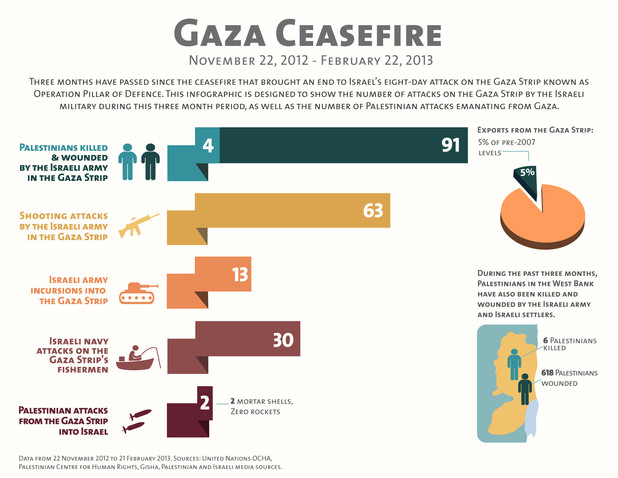Part III of a Feature Analysis on Operation Protective Edge
by Tascha Shahriari-Parsa and Alon Lapid
Recently, discussions have taken place about a potential ceasefire, and Netanyahu has claimed that “Hamas’s rejection of the ceasefire gives Israel full legitimacy to expand the operation to protect our people” — a claim that has been used to warrant Israel’s ground invasion. This, of course, is very interesting, considering the fact that Hamas was never even consulted about the ceasefire and only heard about it through the media.
Furthermore, the contents of the ceasefire serve Israel’s interests, as they declare a “return to the status quo” — a status quo in which Israel continues to occupy Palestine, gracefully strangling Gazans to the tune of Mozart without attracting much attention from the international community. But the contents of the ceasefire don’t even matter when it was never even proposed to Hamas . The fact that Israel has declared its ostensible acceptance of the ceasefire, in the absence of Hamas’s agreement to it (and with the support of media that fails to mention the fact that Hamas was not consulted or even offered the ceasefire proposal officially), gives Israel the appearance of having more legitimacy to “defend itself” from Palestinian rockets. “If Hamas continues to fire at Israel,” Netanyahu said at a press conference , “Israel will have the international legitimacy to take action.”
“For us,” remarked Al Qassam, the armed wing of Hamas, “it [the ceasefire] is not worth the ink that wrote it.”
At the same time, Hamas has made its conditions for a ceasefire unmistakable, having “ asked for the ceasefire conditions from the last major round of fighting with Israel in [November] 2012 to be reinstated, for the re-release of prisoners freed by Israel in exchange for the kidnapped soldier Gilad Shalit, who were rounded up again by Israeli after the kidnapping of three Israeli teenagers, later found murdered, and an end to what it says is Israeli meddling in the Palestinian unity government.” These are, in effect, agreements — such as to “stop all hostilities in the Gaza Strip [by] land, sea and air including incursions and targeting of individuals” — that Israel had already made with Palestine yet later breached.

As the facts from the 2012-2013 ceasefire show, Israel, not Hamas, is notorious for breaching ceasefires.
To add to the facade, Israel has used Egypt to provide the impression of having a neutral moderator of the conflict. In truth, Egypt’s new government has had terrible relations with Hamas—an organization closely related to Egypt’s ousted Muslim Brotherhood — and has in actual fact aligned itself with the interests of Israel. One of Hamas’s demands, for example, entailed the opening of the Rafah border crossing between Gaza and Egypt; however, the Egyptian Foreign Ministry spokesperson said the ceasefire proposal only addresses crossings “between Israel and Gaza.”
“Protests and Propaganda,” Part IV of this five-part series on Palestine and Israel’s ‘Operation Protective Edge’ is available here.
Comments
